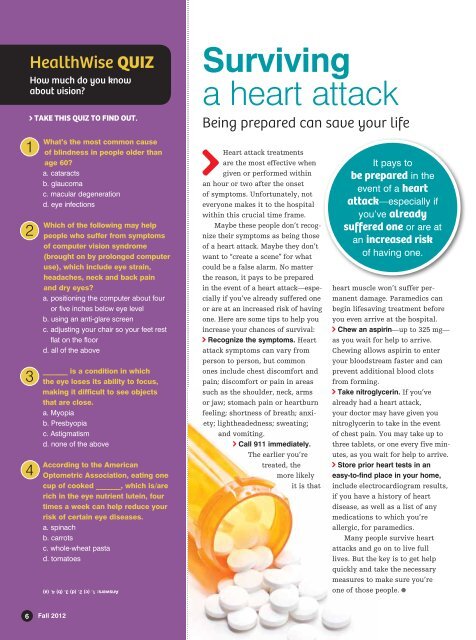Health Connections Fall 2012 - Valley Hospital and Medical Center
Health Connections Fall 2012 - Valley Hospital and Medical Center
Health Connections Fall 2012 - Valley Hospital and Medical Center
You also want an ePaper? Increase the reach of your titles
YUMPU automatically turns print PDFs into web optimized ePapers that Google loves.
<strong>Health</strong>Wise QUIZ<br />
How much do you know<br />
about vision?<br />
1<br />
2<br />
3<br />
4<br />
Take ThIS QUIZ To fInd oUT.<br />
What’s the most common cause<br />
of blindness in people older than<br />
age 60?<br />
a. cataracts<br />
b. glaucoma<br />
c. macular degeneration<br />
d. eye infections<br />
Which of the following may help<br />
people who suffer from symptoms<br />
of computer vision syndrome<br />
(brought on by prolonged computer<br />
use), which include eye strain,<br />
headaches, neck <strong>and</strong> back pain<br />
<strong>and</strong> dry eyes?<br />
a. positioning the computer about four<br />
or five inches below eye level<br />
b. using an anti-glare screen<br />
c. adjusting your chair so your feet rest<br />
flat on the floor<br />
d. all of the above<br />
_______ is a condition in which<br />
the eye loses its ability to focus,<br />
making it difficult to see objects<br />
that are close.<br />
a. Myopia<br />
b. Presbyopia<br />
c. Astigmatism<br />
d. none of the above<br />
According to the American<br />
Optometric Association, eating one<br />
cup of cooked _______, which is/are<br />
rich in the eye nutrient lutein, four<br />
times a week can help reduce your<br />
risk of certain eye diseases.<br />
a. spinach<br />
b. carrots<br />
c. whole-wheat pasta<br />
d. tomatoes<br />
Answers: 1. (c) 2. (d) 3. (b) 4. (a)<br />
6 <strong>Fall</strong> <strong>2012</strong><br />
Surviving<br />
a heart attack<br />
Being prepared can save your life<br />
Heart attack treatments<br />
are the most effective when<br />
given or performed within<br />
an hour or two after the onset<br />
of symptoms. Unfortunately, not<br />
everyone makes it to the hospital<br />
within this crucial time frame.<br />
Maybe these people don’t recognize<br />
their symptoms as being those<br />
of a heart attack. Maybe they don’t<br />
want to “create a scene” for what<br />
could be a false alarm. No matter<br />
the reason, it pays to be prepared<br />
in the event of a heart attack—especially<br />
if you’ve already suffered one<br />
or are at an increased risk of having<br />
one. Here are some tips to help you<br />
increase your chances of survival:<br />
Recognize the symptoms. Heart<br />
attack symptoms can vary from<br />
person to person, but common<br />
ones include chest discomfort <strong>and</strong><br />
pain; discomfort or pain in areas<br />
such as the shoulder, neck, arms<br />
or jaw; stomach pain or heartburn<br />
feeling; shortness of breath; anxiety;<br />
lightheadedness; sweating;<br />
<strong>and</strong> vomiting.<br />
Call 911 immediately.<br />
The earlier you’re<br />
treated, the<br />
more likely<br />
it is that<br />
It pays to<br />
be prepared in the<br />
event of a heart<br />
attack—especially if<br />
you’ve already<br />
suffered one or are at<br />
an increased risk<br />
of having one.<br />
heart muscle won’t suffer permanent<br />
damage. Paramedics can<br />
begin lifesaving treatment before<br />
you even arrive at the hospital.<br />
Chew an aspirin—up to 325 mg—<br />
as you wait for help to arrive.<br />
Chewing allows aspirin to enter<br />
your bloodstream faster <strong>and</strong> can<br />
prevent additional blood clots<br />
from forming.<br />
Take nitroglycerin. If you’ve<br />
already had a heart attack,<br />
your doctor may have given you<br />
nitroglycerin to take in the event<br />
of chest pain. You may take up to<br />
three tablets, or one every five minutes,<br />
as you wait for help to arrive.<br />
Store prior heart tests in an<br />
easy-to-find place in your home,<br />
include electrocardiogram results,<br />
if you have a history of heart<br />
disease, as well as a list of any<br />
medications to which you’re<br />
allergic, for paramedics.<br />
Many people survive heart<br />
attacks <strong>and</strong> go on to live full<br />
lives. But the key is to get help<br />
quickly <strong>and</strong> take the necessary<br />
measures to make sure you’re<br />
one of those people.


